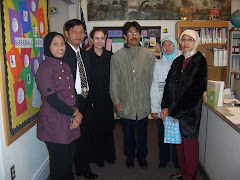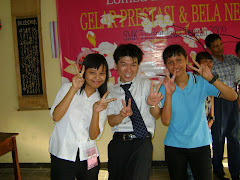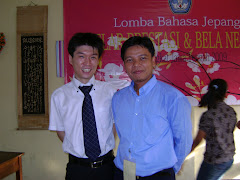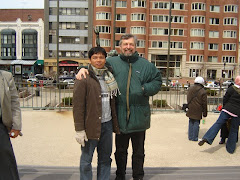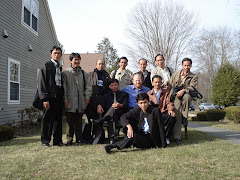Tuesday, November 24, 2009
Ke USA mau?
Tuesday, November 17, 2009
Aged Day
Despite Kama Chinen’s long life, her age has taken a toll on her. She can no longer move around without a wheelchair. Other than that, she is considered a ‘healthy’ for her age. Not just in Okinawa, but in Japan in general, the elderly population is rising rapidly. This has profound social implications for Japan. Insurance premiums are rising, which has some impact on the Japanese government and its tax paying citizens. Although longevity is increasing with age, the quality of life isn’t necessarily rising in direct proportion to age.
Some of the elderly have very high salt and cholestrol diets. The instability of the economy has made it so that some members of the elderly community have to continue working; contributing to a high stress lifestyle. Even in Okinawa, the expansion of the U.S. military has caused environmental degradation, noise pollution and the introduction of fast food (like McDonalds), which has serious implications for the elderly. With these changes, Respect of the Aged Day may become even more important.
As of now, the types of social services that are provided for the elderly depend on the region and city of Japan. Some towns are generous enough to hand out free bentos (べんとう) or boxed lunches to the elderly. Some towns have annual school plays where children perform skits for the elderly. Like towns, individual families also differ in the way they chose to spend Respect for the Aged Day. Some families use this time to go on vacation and some choose to spend quality time with a grandparent or two with gifts in hand.
Thursday, October 1, 2009
BON Festival
The bon odori (盆踊り) is the bon dance. The dance differs from region to region and is performed in groups of several people. There is also a high scaffold called a yagura (やぐら), in which a singer or announcer directs and sings along to the dance. According to legend, the dance was started because a monk was overjoyed that his mother was released from suffering in the underworld. To this day the dances are carried out to show one’s appreciation towards one’s dead ancestors. Nowadays, the dances are carried out for entertainment purposes, rather than for spiritual reasons.
The festival can last up to three days. Towards the end of the festival, a ceremony called tooroo nagashi (灯籠流し) is performed. Tooroo nagashi (灯籠流し) means ‘the floating of the lanterns’. The lanterns are made of paper and usually a candle or incense is placed within the lantern. It’s believed that the lanterns help guide any stray spirits to the underworld. Before the advent of modern science and biology, many Japanese people believed that humans came from sources of water. Therefore the floating of the lanterns represent the human body returning to the origin of one’s birth.
While this is a somewhat solemn occassion, it is also a happy time as well. Fireworks and other lighted displays decorate the streets. Food stalls and games are also held for entertainment. As a result, the day of the dead can have twofold purposes. On the one hand, it’s a time of reflection. On the other hand, it’s a time where many Japanese children develop the happiest memories of their childhood.
Sunday, September 13, 2009
Info Lowongan Pekerjaan
Mr. N
Sunday, September 6, 2009
Tugas Bahasa Inggris XII PJ Grup Sampang
Mother : Nice to meet you. Please come in and sit down!
Father : Glad to see you. My daughter has told us a lot about both of you.
a. I want to introduce my friends c. Let me introduce my friend
b. Please introduce your friends to me d. This is my friends
32. Rizqi : Who … the presentation on the seminar next month?
Hilman : Mr. Aziz from Padjajaran University has agreed to come.
a. is delivering c. was delivering
b. delivers d. will deliver
33. Vina : Have you decided what to order?
Maya : No, I haven’t made up my mind. Any suggestion?
Vina : ….
Maya : It’s sounds great. I need something to quench my thirst.
a. Why don’t we have some soup?
b. What about having fried noodle?
c. Can we have some orange juice?
d. How about ordering some hotdog?
34. Manager : How about the purchasing document? Can I have it now?
Staff : …., Sir. I’ll put it on your desk soon after I finish.
a. I’ve done it c. I finished doing it this morning
b. I am typing it now d. I could help you immediately
35. Indri : Hi, Din. I am in the bank and I don’t know how to use the Automatic
Teller Machine.
Dini : Oh, come on, Indri. You can read the instructions, can’t you? Insert
your card into the slot. Press your PIN, then press “withdraw” and the
amount of money you want. You’ll succeed in drawing your money …..
okay?
a. when you needed the money c. if you follow the instructions correctly
b. if you wrote all the instructions d. when you read the manual
36. Zahra : When did Yohan come to your house?
Alfi : He came when I …. my paper last night
a. types c. has been typing
b. typed d. was typing
37. Banu : Are you familiar with the surrounding here?
Tumil : Quite well. We …. here for eight years.
a. are living c. will live
b. were living d. have been living
38. Niar : Do you remember the boy … you talked to on seminar last week?
Indah : Yes, what’s up?
Niar : He is my teacher’s brother, Harry.
a. who c. whom
b. whose d. which
39. Reva : You room looks great with new decoration.
Titian : Is it? Thanks. I had it …. last week.
a. decorate c. to decorate
b. will decorate d. decorated
40. Manager : Would you mind …. The budget for the salary of the workers starting
from next January?
Rinto : I’d be glad to, Sir.
a. to revise c. revised
b. revise d. revising
Tuesday, September 1, 2009
Remidi Bahasa Jepang XI UJP
1. Nona Karin tiao pagi minum teh.
_________________________________
2. Pak Nurkholis mengajar Bahasa Jepang
_________________________________
3. Tadi malam saya tidak belajar
__________________________________
4. Tuan Taro akan pergi ke Jakarta
__________________________________
5. Tuan Takahashi tidak minum sake
Ganbatte
Friday, August 28, 2009
FRIENDSHIP
PERSAHABATAN
PETER DAN TINA
Peter dan Tina sedang duduk bersama di taman kampus tanpa melakukan apapun,
hanya memandang langit sementara sahabat-sahabat mereka sedang asik
bercanda ria dengan kekasih mereka masing-masing.
Tina: "Duh bosen banget. Aku harap aku juga punya pacar yang bisa berbagi
waktu denganku."
Peter: "Kayaknya cuma tinggal kita berdua deh yang jomblo. cuma kita berdua
saja yang tidak punya pasangan sekarang."
(keduanya mengeluh dan berdiam beberapa saat)
Tina: "Kayaknya aku ada ide bagus deh. kita adakan permainan yuk?"
Peter: "Eh? permainan apaan?"
Tina: " Eng. .. gampang sih permainannya. . Kamu jadi pacarku dan aku jadi
pacarmu tapi hanya untuk 100 hari saja. gimana menurutmu?"
Peter: "Baiklah... lagian aku juga gada rencana apa-apa untuk beberapa bulan
ke depan."
Tina: "Kok kayaknya kamu gak terlalu niat ya... semangat dong! hari ini akan
jadi hari pertama kita kencan. Mau jalan-jalan kemana nih?"
Peter: "Gimana kalo kita nonton saja? Kalo gak salah film The Troy lagi maen
deh. katanya film itu bagus"
Tina: "OK dech.... Yuk kita pergi sekarang. tar pulang nonton kita ke
karaoke ya...
ajak aja adik kamu sama pacarnya biar seru."
Peter : "Boleh juga..."
(mereka pun pergi nonton, berkaraoke dan Peter mengantarkan Tina pulang
malam harinya)
Hari ke 2:
Peter dan Tina menghabiskan waktu untuk ngobrol dan bercanda di kafe,
suasana kafe yang remang-remang dan alunan musik yang syahdu membawa hati
mereka pada situasi yang romantis... Sebelum pulang Peter membeli sebuah
kalung perak berliontin bintang untuk Tina.
Hari ke 3:
Mereka pergi ke pusat perbelanjaan untuk mencari kado untuk seorang sahabat
Peter.
Setelah lelah berkeliling pusat perbelanjaan, mereka memutuskan membeli
sebuah miniatur mobil mini. Setelah itu mereka beristirahat duduk di
foodcourt, makan satu potong kue dan satu gelas jus berdua dan mulai
berpegangan tangan untuk pertama kalinya.
Hari ke 7:
Bermain bowling dengan teman-teman Peter. Tangan tina terasa sakit karena
tidak pernah bermain bowling sebelumnya. Peter memijit-mijit tangan Tina
dengan lembut.
Hari ke 25:
Peter mengajak Tina makan malam di Ancol Bay . Bulan sudah menampakan diri,
langit yang cerah menghamparkan ribuan bintang dalam pelukannya. Mereka
duduk menunggu makanan, sambil menikmati suara desir angin berpadu dengan
suara gelombang bergulung di pantai. Sekali lagi Tina memandang langit, dan
melihat bintang jatuh. Dia mengucapkan suatu permintaan dalam hatinya.
Hari ke 41:
Peter berulang tahun. Tina membuatkan kue ulang tahun untuk Peter. Bukan
kue buatannya yang pertama, tapi kasih sayang yang mulai timbul dalam
hatinya membuat kue buatannya itu menjadi yang terbaik. Peter terharu
menerima kue itu, dan dia mengucapkan suatu harapan saat meniup lilin ulang
tahunnya.
Hari ke 67:
Menghabiskan waktu di Dufan. Naik halilintar, makan es krim bersama,dan
mengunjungi stand permainan. Peter menghadiahkan sebuah boneka teddy bear
untuk Tina, dan Tina membelikan sebuah pulpen untuk Peter.
Hari ke 72:
Pergi Ke PRJ. Melihat meriahnya pameran lampion dari negeri China . Tina
penasaran untuk mengunjungi salah satu tenda peramal. Sang peramal hanya
mengatakan "Hargai waktumu bersamanya mulai sekarang", kemudian peramal itu
meneteskan air mata..
Hari ke 84:
Peter mengusulkan agar mereka refreshing ke pantai. Pantai Anyer sangat sepi
karena bukan waktunya liburan bagi orang lain. Mereka melepaskan sandal dan
berjalan sepanjang pantai sambil berpegangan tangan, merasakan lembutnya
pasir dan dinginnya air laut menghempas kaki mereka. Matahari terbenam, dan
mereka berpelukan seakan tidak ingin berpisah lagi..
Hari ke 99:
Peter memutuskan agar mereka menjalani hari ini dengan santai dan sederhana.
Mereka berkeliling kota dan akhirnya duduk di sebuah taman kota .
15:20 pm
Tina: "Aku haus.. Istirahat dulu yuk sebentar."
Peter: "Tunggu disini, aku beli minuman dulu. Aku mau teh botol saja. Kamu
mau minum apa?"
Tina: "Aku saja yang beli. kamu kan capek sudah menyetir keliling kota hari
ini. Sebentar ya"
Peter mengangguk. kakinya memang pegal sekali karena dimana-mana Jakarta
selalu macet.
15:30 pm
Peter sudah menunggu selama 10 menit and Tina belum kembali juga.
Tiba-tiba seseorang yang tak dikenal berlari menghampirinya dengan wajah
panik.
Peter : " Ada apa pak?"
Orang asing: " Ada seorang perempuan ditabrak mobil. Kayaknya perempuan itu
adalah temanmu"
Peter segera berlari bersama dengan orang asing itu..
Disana, di atas aspal yang panas terjemur terik matahari siang,tergeletak
tubuh Tina bersimbah darah, masih memegang botol minumannya.
Peter segera melarikan mobilnya membawa Tina ke rumah sakit terdekat.
Peter duduk diluar ruang gawat darurat selama 8 jam 10 menit.
Seorang dokter keluar dengan wajah penuh penyesalan.
23:53 pm
Dokter: "Maaf, tapi kami sudah mencoba melakukan yang terbaik. Dia masih
bernafas sekarang tapi Yang kuasa akan segera menjemput. Kami menemukan
surat ini dalam kantung bajunya."
Dokter memberikan surat yang terkena percikan darah kepada Peter dan dia
segera masuk ke dalam kamar rawat untuk melihat Tina. Wajahnya pucat tetapi
terlihat damai..
Peter duduk disamping pembaringan tina dan menggenggam tangan Tina dengan
erat.
Untuk pertama kali dalam hidupnya Peter merasakan torehan luka yang sangat
dalam di hatinya.
Butiran air mata mengalir dari kedua belah matanya.
Kemudian dia mulai membaca surat yang telah ditulis Tina untuknya.
Dear Peter...
ke 100 hari kita sudah hampir berakhir.
Aku menikmati hari-hari yang kulalui bersamamu.
Walaupun kadang-kadang kamu jutek dan tidak bisa ditebak,
tapi semua hal ini telah membawa kebahagiaan dalam hidupku.
Aku sudah menyadari bahwa kau adalah pria yang berharga dalam hidupku.
Aku menyesal tidak pernah berusaha untuk mengenalmu lebih dalam lagi
sebelumnya..
Sekarang aku tidak meminta apa-apa, hanya berharap kita bisa memperpanjang
hari-hari kebersamaan kita. Sama seperti yang kuucapkan pada bintang jatuh
malam itu di pantai,
Aku ingin kau menjadi cinta sejati dalam hidupku. Aku ingin menjadi
kekasihmu selamanya dan berharap kau juga bisa berada disisiku seumur
hidupku. Peter, aku sangat sayang padamu.
23:58
Peter: "Tina, apakah kau tahu harapan apa yang kuucapkan dalam hati saat
meniup lilin ulang tahunku?
Aku pun berdoa agar Tuhan mengijinkan kita bersama-sama selamanya.
Tina, kau tidak bisa meninggalkanku! hari yang kita lalui baru berjumlah 99
hari!
Kamu harus bangun dan kita akan melewati puluhan ribu hari bersama-sama!
Aku juga sayang padamu, Tina.. Jangan tinggalkan aku, jangan biarkan aku
kesepian!
Tina, Aku sayang kamu...!"
Jam dinding berdentang 12 kali..... jantung Tina berhenti berdetak.
Hari itu adalah hari ke 100...
Katakan perasaanmu pada orang yang kau sayangi sebelum terlambat.
Kau tidak akan pernah tahu apa yang akan terjadi besok.
Kau tidak akan pernah tahu siapa yang akan meninggalkanmu dan tidak akan
pernah kembali lagi.
*Dear Friends* ,
*
Tahukah anda* kalau orang yang kelihatan begitu tegar
hatinya, adalah orang
yang sangat lemah dan butuh pertolongan?
*
Tahukah anda* kalau orang yang menghabiskan waktunya
untuk melindungi
orang lain adalah justru orang yang sangat butuh
seseorang untuk
melindunginya?
*
Tahukah anda* kalau tiga hal yang paling sulit untuk
diungkapkan adalah :
Aku cinta kamu, maaf dan tolong aku
*
Tahukah anda* kalau orang yang suka berpakaian *warna
merah* lebih yakin
kepada dirinya sendiri?
*
Tahukah anda* kalau orang yang suka berpakaian *kuning
* adalah orang yang
menikmati kecantikannya sendiri?
*
Tahukah anda * kalau orang yang suka berpakaian *hitam
*adalah orang yang
ingin tidak diperhatikan dan butuh bantuan dan
pengertian anda?
*
Tahukah anda * kalau anda menolong seseorang,
pertolongan tersebut
dikembalikan dua kali lipat?
*
Tahukah anda* bahwa lebih mudah mengatakan perasaan
anda dalam tulisan
dibandingkan mengatakan kepada seseorang secara
langsung? Tapi tahukah
anda bahwa hal tsb akan lebih bernil ai saat anda
mengatakannya dihadapan
orang tsb?
*
Tahukah anda* kalau anda memohon sesuatu dengan
keyakinan, keinginan anda
tsb pasti dikabulkan?
*
Tahukah anda* bahwa anda bisa mewujudkan impian anda,
spt jatuh cinta,
menjadi kaya, selalu sehat, jika anda memintanya dengan
keyakinan, dan
jika anda benar2 tahu, anda akan terkejut dengan apa
yang bisa anda
lakukan.
*
Tapi jangan percaya semua yang saya katakan* , sebelum
anda mencobanya
sendiri, jika anda tahu seseorang yang benar2 butuh
sesuatu yg saya
sebutkan diatas, dan anda tahu anda bisa menolongnya,
anda akan melihat
bahwa pertolongan tsb akan dikembalikan dua kali lipat.
Hari ini, *bola PERSAHABATAN * ada dilapangan anda,
kirim ini kepada orang
yang benar2 sahabat anda (termasuk saya jika saya juga
sahabat). Juga,
jangan merasa kecewa jika tidak ada seseorang yang
mengirimkannya
kembali kepada anda, anda akan mengetahui bahwa anda
akan tetap menjaga bola untuk
orang lainnya ........ karena *lebih baik memberi daripada
menerima *bukan ??? =)
Ok, inilah yang harus anda lakukan . :
Kirim kepada SEMUA TEMAN anda!
Tapi anda harus MELAKUKANNYA dalam satu jam setelah
membuka surat ini!
Sekarang . BUAT 1 PERMINTAAN !!!!
Buat sekarang,
Ini kesempatan terakhir anda!!!
Saya harap anda telah membuat suatu permintaan, Sekarang
kirim surat
ini kepada:
1 orang : permintaan anda akan terwujud dalam satu tahun
3 orang : 6 bulan
5 orang : 3 bulan
6 orang : 1 bulan
7 orang : 2 minggu
8 orang : 1 minggu
9 orang : 5 hari
10 orang : 3 hari
12 orang : 2 hari
15 orang : 1 hari
20 orang : 3 jam
Wednesday, August 26, 2009
Partikel "yo"
In addition, yo (よ) can be used to state something with authority. If someone says, muri des yo (むりですよ), it’s like someone saying, ‘I guarantee you that it’s impossible’. The tone of this statment is made very strong by the use of the yo (よ) particle, so be careful about using it towards certain people. For example, I wouldn’t use the yo (よ) particle in a sentence with a boss. I think it would come off as rude if you were to assert yourself so strongly in front of your superior.
The yo (よ) particle can also be used to brag about something. For example, if you say, goukaku shita yo (ごうかくしたよ), which can be translated as, ‘Of course I passed.’ I left the subject wide open for interpretation. It could be a test, an interview, whatever you want it to be. You could also say, kantan des yo (かんたんですよ), which could mean, ‘Of course it’s easy.’ I also left this wide open for interpretation.
The main point that I tried to emphasize is that with all these phrases, the yo (よ) particle can take on different undertones. Yes, it’s true that in the general sense yo (よ) is assertive and authoritative, but notice how it’s hard to exact an all purpose explanation that is the same for every phrase. So the next time you use yo (よ), think about how you want to express yourself.
Tuesday, August 25, 2009
Remidi Bahasa Inggris X UPW
"It's Zahra's first day in her apartment.
1. Abriel : Hello, Zahra. How _______ ______ today?
Zahra : Not _____. And _____ ______ you?
Anna : ______, thanks
2. Frank : _______ me, ______ you Tiffany?
Zahra : No, _____ _____ ______. My _____ ____ Kireina Zahra. I live downstairs.
Frank : Oh, ____ to ____ you, Zahra. ________ _______ Frank Eddy
Zahra : _____ ______ you _______ ? _______ _____ _____ you, too.
3. Charlie : Hello, Are _____ Kireina Zahra?
Zahra : ____, _____ am
Charlie : How _____ you _____ ? ____ ____ Charlie Berlin, _____ new neighbor.
Zahra : _____ ____ ____ ___? ____ to ____ you, Ms. Berlin
Monday, August 24, 2009
Woro-woro untuk Alumni SMK 1 tahun ini
Be punctual, pls!
Tuesday, August 11, 2009
Makna Partikel 'Ne'
Ne (ね) is also a type of softener used when you want to reject someone’s proposal. For example, if someone asks you ‘じかんが ありますか‘ or jikanga arimaska, which literally means, ‘Do you have some time’ but in context can mean ‘Are you free to spend some time with me’. You want to reject the person, but do it in a way that’s not mean so you could say, ‘ちょっとね…’ (chotto). Chotto (ちょっと) can be translated as ‘ummm…’ but it literally means ‘a little’. In this case, ne (ね) can have the meaning ‘well…’ or ‘you know…’ Unlike the example in the paragraph above, ne (ね) is not use to gain confirmation. It’s kind of used to say, ‘Well…it’s a bit inconvenient for me…you know?’
Ne (ね) can also be used to say a command in an indirect manner. For example, let’s say someone is waiting in line and says, ‘じかんが ありませんね‘ (jikanga arimasen ne). This literally means, ‘there’s no time’ but in the context of the situation, it could mean, ‘Please hurry up. There’s no time, you know’.
The difficult thing about the Japanese language is that there may be certain undertones or implications within a sentence that depend upon the context of a situation. The use of the ne (ね) particle is where it becomes useful to be socially aware of the implications involved in the meaning of every sentence.
Monday, August 10, 2009
Tugas Bahasa Inggris XII PJ
The previous tasks are already done, just take it.
Good Luck.
Mr. N
Friday, August 7, 2009
Wednesday, July 22, 2009
Kalimat Sederhana
As you see in this sentence, the ja arimasen (じゃありません) has replaced the des (です). In addition, the ja arimasen (じゃありません) comes right after the noun. You can form the negative form of any sentence that has a noun. I’ll talk about negating sentences with adjectives in another post.
Just so you know, jaa arimasen (じゃありません) is the contracted form of negating a sentence. The uncontracted form is dewa (でわ). Using the example above, I am not a Japanese person is, “わたしは にほんじんでわありません” (watashiwa nihonjin dewa arimasen).
Subjects can be dropped in Japanese. Therefore, the sentence, “I am a Japanese person” can have the “I” dropped if it’s obvious that you’re doing the talking. Simply saying, “にほんじんです” is adequate enough. This is especially true when you’re asking people questions in Japanese. You can ask, “Are you a Japanese person?” by asking, “にほんじんですか” (nihonjin deska). The Japanese word for “you” in Japanese is “anata” (あなた). You’re free to include anata (あなた) as the subject of the sentence when you’re asking someone a question, but it’s a bit redundant.
Des (です) is a flexible verb. You can use des (です) to say, “am”, “are”, and “is”. For example the sentence, “Misora is ten years old” in Japanese is “みそらは じゅっさいです“. The same goes for the negative form of des (です) which is jaarimasen (じゃありません). One last thing, before I go, des (です) and jaarimasen (じゃありません) is in the formal, present tense. I’ll write another post on the past tense as well.
One last note, the particle は in わたしは にほんじんでわありません and other sentences, is pronounced as wa, not ha. は is also a subject marking particle. However, since subjects can be dropped, this particle can also be dropped.
Classroom Vocabs
student - gakusee (がくせい)
teacher - sensee (せんせい)
class - kurasu (クラス)
class - jugyoo (じゅきょう)
blackboard - kokuban (こくばん)
book - hon (ほん)
dictionary - jisho (じしょ)
homework - shukudai (しゅくだい)
pencil - enpitsu (えんぴつ)
pen - pen (ペン)
question - shitsumon (しつもん)
answer - kotae (こたえ)
eraser - keshigomu (けしゴム)
desk - tsukue (つくえ)
chair - isu (いす)
Tuesday, July 14, 2009
Warna dalam Bahasa Jepang
black - Kuro (くろ)(黒)
blue - Ao (あお)(青)
light blue - mizuiro (みずいろ)(水色)
brown - Chairo (ちゃいろ)(茶色)
golden - kiniro (きんいろ)(金色)
red - Aka (あか)(赤)
white - Shiro (しろ)(白)
pink - Momoiro (ももいろ)(桃色)
pink - pinku (ピンク)
orange - daidaiiro (だいだいいろ)(橙色)
green - midori (みどり)(緑)
light green - kimidori (黄緑)
yellow - kiiro (きいろ)(黄色)
purple - murasaki (むらさき)(紫)
grey - haiiro (はいいろ)(灰色)
grey - nezu (ねず)
Friday, July 10, 2009
Tugas Bahasa Inggris UJP
41. Give your opinion (agree or disagree) to the following case and tell your reason.
Children are not allowed to have hand phone.
A. (+)...............................
B. ( - ) .............................
42. Give suggestions on the following situations.
A. Your mother will go out, but it’s rather cloudy.
What is your suggestion?
…………………………………………………………………..
B. It’s very hot in this room.
What is your suggestion?
…………………………………………………………………...
C. Your friend found that his work is boring.
What is your suggestion?
……………………………………………………………………
43. You are inviting your friend to have dinner with you. Please complete
this dialog!
A: . . . . . . . . ……………. . . . . . ?
B: . . . . ………. . . Where will we have dinner? (Accept the invitation)
A: At “LEZAT” Restaurant.
44. Respond the statement bellow using the expressions to convince other.
A. Sanny : I’m afraid I won’t pass the promotion test.
Nina : I assure you . . . . . . . . . . . . . . . . . .
B. Tonny : I’m not confident about joining band festival.
Ardy :I believe . . . . . . . . . . . .. . . . . . . . . . . .
45. Complete the sentences below using must or had to.
A.We . . . . submit the assignment yesterday.
B.This package is very important I . . . . . deliver it soon.
C.Your shoes are very dirty.
You . . . . . clean them.
46. Change the following sentences into passive voice!
A.Valentino Rosy has won MOTO GP race eight times.
…………………………………………………………….
B.Manchester United defeated Arsenal last week.
……………………………………………………………..
C.FIFA will hold World Cup 2010 in South Africa.
……………………………………………………………..
47. Put the verb in the brackets into the correct form of conditional sentence
type II.
A.If you (not come) to my party, I (feel) disappointed.
B.If I (hungry), I (have) to find something to eat.
48. Arrange the following jumbled instructions!
A.Now, the rice is ready to be served.
B.Then, boil and cool it the slowly for about 20 minutes until there
is no more water.
C.Well, let me tell you the steps of cooking rice.
D.Next put the rice with some water in a pot.
E.After that, put the rice to the simmer and steam it about 45 minutes.
F.First, wash some rice in cold water.
…………………………………………………………………..
…………………………………………………………………..
…………………………………………………………………..
49. What would you say to compliment or congratulate other people
to this situation?
Your Father got a promotion to be Sales Manager in his office.
You : . . . . . . . . . . . . . . . . . . . . . .
Your Father :. . . . . . . . . . . . . . . . . . . . . .
50. Arrange these words into good sentences!
A.am – at – say – I – the – can – how – moment – delighted – I.
B.for – the – years – graph – five – shows – last – sales – our – the .
Please send your answers via my blog.
Good Luck
Mr. N
Wednesday, July 8, 2009
Woro-Woro utuk UJPers
Please kindly send me your e-mail address as soon as possible because I will give you assignment of English. It is a must so do it accordingly.
Mr. N
Vegetable Vocabulary
やさい - vegetable
たまねぎ - onion
トマト - tomato
ブロッコリー - brocolli
レタス - lettuce
きゅうり - cucumber
ポテト - potato
にんじん - carrot
まめ - bean
ほうれんそう - spinach
だいこん - radish
ズッキーニ - zucchini
ししとう - green pepper
わかめ - seaweed
Friday, July 3, 2009
Restaurant Food Vocabulary
スパゲッテイ - (supagetti) spaghetti
カレー - (karee) curry
そば - (soba) buck wheat noodles (usually served cold)
うどん - (udon) thick white noodles (usually served ward)
サンドイッチ - (sandoicchi) sandwich
アイスクリーム - (aisukuriimu) ice cream
ラーメン - (raamen) ramen noodles
ハンバーガー - (hanbaagaa) hamburger
コーヒー - (koohii) coffee
コーラ - (coora) cola
サラダ - (sarada) salad
おちゃ - (ocha) tea
ジュース - (juusu) juice
ミルク - (miruku) milk
Friday, June 19, 2009
Japanese Banknote
¥2000 : Is green in color and has shureimon (守礼門) on one side. Shureimon (守礼門) is the name of one of the gates of Shurijoo (首里城) or Shuri Castle. Shuri Castle is one of the famous castles in Japan. The other side of the banknote has a portrait of Murasaki Shikibu (紫式部). Murasaki Shikibu (紫式部) is the author of Genji Monogatari (源氏物語) or the Tale of Genji.
¥5000 : is purple and contains a portrait of Higuchi Ichiyoo (樋口 一葉), also known as Higuchi Natsuko (樋口 夏子). She is considered one of the most prominent female writers in Japan. Her most famous works are Takekurabe (たけくらべ) and Nigorie (にごりえ). She initially wrote to support her family. Little did she know her work would become famous. The other side contains a painting done by Ogata Koorin (尾形 光琳).
¥10000 : contains a portrait of Fukuzawa Yukichi (福澤 諭吉). Fukuzawa is considered one of the founders of modern Japan. He was a progressive, meaning he supported Japan’s modernization. His lasting contribution to Japanese society came in the form of a newspaper called Jiji Shinpo (時事新報) or Current Events. His newspaper helped the Japanese people gradually embrace change.
Tuesday, June 16, 2009
Japanese Months
February: nigatsu (二月) (にがつ)
March: sangatsu (三月) (さんがつ)
April: shigatsu (四月) (しがつ)
May: gogatsu (五月) (ごがつ)
June: rokugatsu (六月) (ろくがつ)
July: shichigatsu (七月) (しちがつ)
August: hachigatsu (八月) (はちがつ)
September: kugatsu (九月) (くがつ)
October: juugatsu (十月) (じゅうがつ)
November: juuichigatsu (十一月) (じゅういちがつ)
December: juunigatsu (十二月) (じゅうにがつ)
The months are pretty straightforward. All you have to do is place the number of the month with the counter “gatsu”. So for April it would be the word four or “shi” plus gatsu, which means month. The first parentheses contains the kanji and the second parentheses contains the hiragana.
Saturday, June 13, 2009
UJP's tradition in UN
Wednesday, June 10, 2009
Labels of Japanese People
Issei (一世) refers to people who were born in Japan, but have immigrated to another country. This term is especially used to refer to people in the U.S and Brazil. It’s also used to decribe the immigrants who came to the U.S. in the late 1800s and early 1900s. The issei (一世) in Brazil were mostly coffee plante laborers. Most of the laborers wanted to earn money and go right back to Japan after saving some money. For most people, this never happened. Low wages prevented people from saving enough money to even buy a ticket back home. The issei (一世) in the U.S. were sugar plant workers in Hawaii. Many had no permanent plans to stay in Hawaii, but ended up but having families and living in the U.S.; never to return to Japan.
The Nissei (二世) is a term used to describe a generation of people who were born to at least one issei (一世) parent and were born in a country other than Japan. The Nissei (二世) frequently suffer from identity crises. It’s usually refers to people who were born after WWI. When they were interned in U.S. and Canadian camps during WWII, many of the nissei (二世) were torn between their Japanese roots and their new found identity as Americans. A lot of the nissei (二世) knew how to speak Japanese and were taught by their issei (一世) parents to uphold Japanese values. However, the nissei (二世) were also taught English and American values in public schools. Many of them were torn as to where they should place their loyalty, especially after they were interned.
The Sansei (三世) is used to describe the generation of people who are born to at least one nissei (二世) parent. In many cases, the sansei (三世) were encouraged by their parents to obtain higher education. This also means that many of the sansei (三世) spoke fluent English and almost little or no Japanese. Unlike the issei (一世), the sansei (三世) typically view themselves as Americans, or Canadians with Japanese ancestry. Some have married outside of the Japanese community and have adopted Christianity as their religion. The sansei (三世) were the most vocal activists in lobbying for the U.S. government to apologize for the internment of Japanese citizens.
Nikkeijin (日系人) is a general term used to describe Japanese emigrants and their descendants. The nikkeijin (日系人) refers to the issei (一世), nissei (二世) and sansei (三世). In many cases, the Japanese government does not grant citizenships to people who are yonsei (四世) and up. If you can prove that you are a sansei (三世) or below, you may apply for citizenship. A similar term is dekasegi (出稼ぎ). Dekasegi (出稼ぎ) refers especially to Japanese Brazilians who have immigrated to Japan to find better jobs. There is considered discrimination against the dekasegi (出稼ぎ). They are not viewed as “Japanese” and are frequently considered as foreigners.
Sunday, June 7, 2009
Sentoo
A sentoo (銭湯) is a public bathhouse. Even though people have bathtubs at home, a sentoo (銭湯) is a bit different from your ordinary bathtub.
A sentoo (銭湯) will have separate sections for each gender. Male children up to ten years of age can go with their mothers. Other than that, the gender division is strictly enforced. That means no peeking! If you’re caught peeking in the opposite sex’s changing room, you’re definitely going to take a trip to the police station, so mind your sentoo manners! The men’s area will have a bluish door with the word otoko (男) on it. The women’s side is red with the word for onna (女) on it. Otoko = man. Onna = woman.
Every sentoo (銭湯) has a locker room where you store your clothes and other belongings. Before you enter the locker room you have to pay an entrance fee. Each sentoo (銭湯) has their own rates. Some charge for the number of hours you plan to stay, while others charge a flat fee no matter how long or short you stay. Once you’ve paid, you’ll be given a key with your locker number on it. In some places, you can store your belongings in any random lockers, except for the ones that are reserved for regular customers.
You are not permitted to wear any clothing once you enter the public bathing area. The only thing you can bring is a small bucket with soap, shampoo, back scrubber, small towel and maybe some sandals. They sell these things at the sentoo (銭湯), but they’re on the pricy side. They bathing area also contains small stools that you can sit on. These stools have been used, so I personally place a towel on the stool, just in case.
The floor of the bathing area is covered with tiles, which can cause your barefoot to get very hot. The bathhouse that I go to regularly, allows people to bring clog-like sandals, so I bring sandals. The sandals allow me to walk around with ease without stinging my feet. However, check with the person at the front desk to make sure you can do this. Not all places allow footwear in the bathing area.
The waters of the sentoo (銭湯) are steaming hot. You can cool off in another room with a bathtub full of cold water. The catch is that you have to pay an extra fee. There’s a person watching at the entrance to this room, so you probably won’t be able to sneak past without paying. Besides, you need to show your wristband, which proves that you’ve paid the extra fee. One way to cool down without having to pay such a big fee is to buy cold drinks at the vending machines.
So why go to a sentoo when you have a bathtub at home? It’s just relaxing. The water never gets cold and you can sit in the water for hours just resting. Too bad I don’t own a sentoo. If I did, I’d go there practically every day.
Friday, June 5, 2009
Answer to Kanji Practice
1) Meaning: space, interval. Kun: ま. On: カン. 間
2) Meaning: three. Kun: み. On: サン. 三
3) Meaning: six. Kun: む On: ロク. 六
4) Meaning: eye. Kun: め On: ガン. 眼
5) Meaning: tree, wood. On: モク Kun: き. 木
6) Meaning: next, come. On: ライ Kun: くろ. 来
7) Meaning: power, strength. On: リイ Kun: ちから. 力
![]() Meaning: weak. On: ルイ Kun: よわい. 羸
Meaning: weak. On: ルイ Kun: よわい. 羸
9) Meaning: cool, cold. On: レイ Kun: つめたい. 冷
10) Meaning: old age, elderly. On: ロウ Kun: ふける. 老
Wednesday, June 3, 2009
Hasil Lomba
Setelah melalui tahapan lomba pada hari Minggu 31 Mei - 1 Juni 2009 akhirnya menetapkan juara - juara sebagai berikut :
- Juara I : Kontingen Kota Semarang
- Juara II : Kontingen Kota Magelang
- Juara III: Kontingen Kab. Purbalingga
Dengan demikian Kontingen Kota Semarang berhak menjadi wakil Jawa Tengah di GPBN Tingkat Nasional .
Adapun rekap penilaian adalah sebagai berikut :
| NO | KOTA / KAB | NAMA PESERTA | NILAI | RANGKING | ||||
| SHODOU | ROLE PLAY | READING | LCC | TOTAL NILAI | ||||
1 | Kota Semarang | Yunitasari | 392,5 | 454,33 | 265,66 | 400 | 1512,5 | 1 |
| Novi Wulandari | ||||||||
| 2 | Kota Magelang | Anarti | 332,67 | 469,33 | 285 | 400 | 1487 | 2 |
| Novarinda Anggi P | ||||||||
| 3 | Kab. Purwokerto | Khaulah Syahdiah | 355,67 | 431,33 | 272,83 | 200 | 1259,83 | 5 |
| Annisa Nur D | ||||||||
| 4 | Kab. Boyolali | Winarno | 306,167 | 376,67 | 236,167 | 200 | 1119 | 8 |
| Ani Mustikawati | ||||||||
| 5 | Kab. Rembang | Siti Kholifah | 289 | 411,67 | 175,83 | 100 | 976,5 | 11 |
| M. Rudi Ainun Najib | ||||||||
| 6 | Kab. Purbalingga | Nur Sulistiowati | 354,5 | 465 | 286,83 | 300 | 1406,33 | 3 |
| Wiwit Adi Saputri | ||||||||
| 7 | Kab. Temanggung | Erlina Puspita Sari | 280,5 | 246,67 | 247 | 400 | 1174,167 | 7 |
| Ristanti | ||||||||
| 8 | Kab. Semarang | Tuti Winarni | 328,167 | 418,333 | 261,5 | 300 | 1308 | 4 |
| Rifatul Hidayah | ||||||||
| 9 | Kab. Cilacap | Weni Nur Andriani | 252,67 | 421,67 | 262,83 | 300 | 1237,167 | 6 |
| Eva April Liliyana | ||||||||
| 10 | Kab. Kendal | Evi Nurlia | 291,33 | 400,67 | 202 | 200 | 1094 | 10 |
| Diyah Ayu Safitri | ||||||||
| 11 | Kab. Purworejo | Lina Anggraeny | 215,33 | 399,33 | 176,67 | 100 | 891,33 | 12 |
| Yulyo Wahyu PT | ||||||||
| 12 | Kota Salatiga | Asep D | 285,167 | 469,333 | 252,83 | 100 | 1107,33 | 9 |
| Purnama | ||||||||
Untuk rekap per mata lomba akan diupload secepat mungkin
Penyelengara Ketua Juri
Idhi Tri Atmojo Iwata Toshikazu
Role-Play Bahasa Jepang
Tuesday, June 2, 2009
Kanji Practice
Here are the answers to the hiragana section: 1) ねこ (cat) 2) なに (what) 3) たこ (octopus) 4) はい (hai) 5) ふうふ (married couple) 6) なか (middle, center) 7) のう (brain) 8) はこ (box) 9) はは (mother) 10) はな(flower)
Here are the answers to the katakana section: 1) テスト (test) 2) ナウ (now) 3) ナイト (night) 4) ナイス (nice) 5) ヌード (nude) 6) ノウ (know) 7) タイ (tie) 8) タフ (tough) 9) ハイ (high) 10) ツー (two)
Today I’m going to give out some kanji exercises. I’ll provide the meaning, the kun reading, which is the native Japanese reading and the on reading, which is the pronunciation borrowed from the Chinese. The on will be in katakana. The kun will be in hiragana. All you have to do is provide the characters in the comment section. All these characters are pretty standard in the Japanese language, so hopefully you won’t have too much difficulty with this exercise.
1) Meaning: space, interval. Kun: ま. On: カン.
2) Meaning: three. Kun: み. On: サン.
3) Meaning: six. Kun: む On: ロク.
4) Meaning: eye. Kun: め On: ガン.
5) Meaning: tree, wood. On: モク Kun: き
6) Meaning: next, come. On: ライ Kun: くろ.
7) Meaning: power, strength. On: リイ Kun: ちから.
Meaning: weak. On: ルイ Kun: よわい.
9) Meaning: cool, cold. On: レイ Kun: つめたい.
10) Meaning: old age, elderly. On: ロウ Kun: ふける
Monday, May 25, 2009
More on Hiragana Katakana
Thank you to everyone who answered the questions to the previous post. Here are the answers to the hiragana section: 1) ai (あい) love 2) ue (うえ) on 3) akai (あかい) red 4) eki (えき) station 5) sushi (すし) sushi 6) sake (さけ) sake 7) koi (こい) carp fish ![]() iie (いいえ) no 9) aoi (あおい) blue/green 10) sai (さい) years old. Now the katakana section: 1) kisu (キス) kiss 2) keei (ケーキ) cake 3) ia (イア) ear 4) kiui (キウイ) kiwi 5) ea (エア) air 6) kea (ケア) care 7) saiko (サイコ) pyscho
iie (いいえ) no 9) aoi (あおい) blue/green 10) sai (さい) years old. Now the katakana section: 1) kisu (キス) kiss 2) keei (ケーキ) cake 3) ia (イア) ear 4) kiui (キウイ) kiwi 5) ea (エア) air 6) kea (ケア) care 7) saiko (サイコ) pyscho ![]() kaa (カー) car 9) sukii (スキー) ski 10) sukai (スカイ) sky
kaa (カー) car 9) sukii (スキー) ski 10) sukai (スカイ) sky
Once again, here are all the list of syllables you will need to do this next exercise. The hiragana is provided first and the katakana is provided second.
ta - (た)(タ)
chi - (ち)(チ)
tsu - (つ)(ツ)
te - (て)(テ)
to - (と)(ト)
na - (な)(ナ)
ni - (に)(ニ)
nu - (ぬ)(ヌ)
ne - (ね)(ネ)
no - (の)(ノ)
For this exercise, transcribe these letters into hiragana. All the characters you will need are provided in today’s list of syllables and the syllables of the last post. 1) neko 2) nani 3) tako 4) hai 5) fuufu 6) naka 7) nou ![]() hako 9) haha 10) hana
hako 9) haha 10) hana
The list for katakana. 1) tesuto 2) nau 3) naito 4) naisu 5) nuudo 6) nou 7) tai ![]() tafu 9) hai 10) tsuu
tafu 9) hai 10) tsuu
Sunday, May 24, 2009
Hiragana Practice
a - (あ)(ア)
i - (い)(イ)
u - (う)(ウ)
e - (え)(エ)
o - (お)(オ)
ka - (か)(カ)
ki - (き)(キ)
ku - (く)(ク)
ke - (け)(ケ)
ko - (こ)(コ)
sa - (さ)(サ)
shi - (し)(シ)
su - (す)(ス)
se - (せ)(セ)
so - (そ)(ソ)
Here’s the assignment: write these words into hiragana (ひらがな) in the comments section. The only rule is this: you can do any of the words, but each person can only do a maximum of 5 words. There is no minimum. 1) ai 2) ue 3) akai 4) eki 5) sushi 6) sake 7) koi� iie 9) aoi 10) sai
and write these words into katakana (かたかな) in the comments section. The only rule is this: you can do any of the words, but each person can only do a maximum of 5 words. There is no minimum. Here’s a hint: if you see two consecutive vowels use ー. 1) kisu 2)keeki 3) ia 4) kiui 5) ea 6) kea 7) saiko� kaa 9) sukii 10) sukai
Monday, May 18, 2009
JUKNIS LKS B. JEPANG
| PETUNJUK TEKNIS LOMBA GPBN SMK BAHASA JEPANG I. Shodo
II. Role Play 1. Peserta adalah seluruh perwakilan Kota / Kabupaten. 2. Perlengkapan lomba disediakan sendiri oleh peserta 3. Sebelum lomba harus menyerahkan skrip / naskah skenario Role Play ke panitia dengan alamat : 4. Pengiriman Skrip paling lambat 27 Mei 2009 5. Tema Role Play disesuaikan dengan jurusan peserta, atau memilih 1 tema dari yang sudah disodorkan di petunjuk / kisi-kisi. 6. Skrip / naskah boleh ditulis tangan yang mudah dibaca atau diketik. 7. Skrip / naskah boleh ditulis dengan kana atau romaji. 8. Waktu yang disediakan adalah 15 menit ( tidak termasuk persiapan ) 9. Urutan penampilan disesuaikan dengan hasil undian. 10. Point yang di nilai adalah: o Penampilan o Pilihan kata / pola kalimat o Kerja sama tim o Alat Pendukung ( Alat, Pakaian, dll ) 11. Point tertinggi tim adalah 400 III. Wawancara 1. Dilakukan setelah Role play selesai; 2. Pertanyaan yang diajukan juri dalam bahasa Jepang; 3. Pertanyaan ditujukan kepada tim, bukan perorangan; 4. Materi yang ditanyakan adalah seputar Role play; 5. Pertanyaan dijawab oleh tim setelah berunding/ salah satu peserta; 6. Waktu yang disediakan adalah 5 menit; 7. Jumlah pertanyaan ditentukan oleh juri; 8. Point yang dinilai adalah kesesuaian jawaban dengan pertanyaan; IV. Rodoku (Membaca) 1. Peserta adalah seluruh perwakilan kota / kabupaten; 2. Perlengkapan lomba disediakan oleh panitia; 3. Sebelum lomba akan diadakan undian urutan penampilan; 4. Materi yang dibaca adalah wacana bahasa Jepang modern; 5. Tulisan materi berkarakter hiragana dan katakana; 6. Peserta membaca satu bacaan dari 4 bacaan yang disediakan; 7. Peserta mengambil undian bacaan yang akan dibaca; 8. Waktu yang disediakan adalah 3 menit persiapan dan 5 menit pelaksanaan; 9. Point yang dinilai adalah : o Kelancaran o Intonasi ( pemenggalan kata, irama,dll) o Ekspresi 10. Point tertinggi adalah 300; 11. Perolehan point kontingen adalah nilai akumulasi peserta. V. LCC 1. Tim adalah seluruh perwakilan Kota / Kabupaten; 2. Materi adalah pelajaran bahasa Jepang dasar, umum dan budaya Jepang; 3. Buku sumber merujuk Nihongo 1 The Japan Foundation dan Kamus Istilah Masyarakat dan Kebudayaan Jepang karangan Drs.Sudjianto,M.Hum.; 4. Kisi-kisi soal sudah dikirimkan ke Dinas Pendidikan / MKKS kota/kabupaten; 5. Bentuk soal berupa Pilihan Ganda (audio-visual) dan jawab langsung; 6. Semua tim hanya menjalani 1 babak, tidak ada babak penyisihan-final; 7. Penempatan babak dan regu ditentukan oleh hasil undian; 8. Tidak ada penentuan pemenang. 9. Pertanyaan dibagi ke dalam pertanyaan wajib (nilai 100,50 dan 0), pertanyaan 25) dan rebutan (100 dan minus100).à50à75àlemparan (100 10. Pertanyaan wajib diperbolehkan ‘pass’ untuk menuju soal berikutnya dan akan kembali diulang apabila waktu masih ada. 11. Penilaian LCC didasarkan atas perolehan peringkat yaitu : o Untuk peringkat I mendapat Point 400 o Untuk peringkat II mendapat Point 300 o Untuk peringkat III mendapat Point 200 o Untuk peringkat IV mendapat Point 100 |
| PETUNJUK PELAKSANAAN LOMBA GPBN SMK 2009 |
| Written by Panitia Lomba Bahasa Jepang GPBN |
| Saturday, 16 May 2009 |
| Waktu dan Tempat Waktu : 30 Mei – 2 Juni 2009
Jam : 09.00 – 14.00 WIB
08.00 – 10.00 : Shodou
08.00 – 10.00 : Rodoku ( Membaca )
Pengumuman Pemenang Lomba dan Penutupan |




